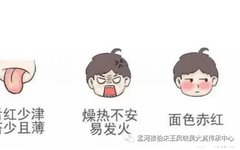Yin deficiency with excessive Yang fire refers to a state where Yin fluids are insufficient, leading to an overabundance of virtual fire. In Traditional Chinese Medicine (TCM), Yin and Yang encompass: Qi as Yang, body fluids as Yin, above as Yang, below as Yin, left as Yang, and right as Yin. The balance of Yin and Yang in the body signifies health, and the goal of TCM in treating diseases is to replenish deficiencies, drain excesses, and balance Yin and Yang. When Yin and Yang are balanced, it is the standard of health. The primary function of Yin is not only to nourish and moisten the organs and tissues but also to restrain Yang Qi to prevent its excessive outward expression. Yang Qi is characterized by heat, movement, and ascension, while Yin corresponds to cold, stillness, and descent. If Yin is deficient and unable to restrain Yang Qi, the body will exhibit a state of excessive Yang Qi, known as “Yin deficiency leads to internal heat.” Yin deficiency results in Yang excess, which transforms into virtual fire. Yin deficiency with excessive Yang fire has become a condition that many modern individuals are particularly prone to, causing discomfort throughout the body and a significant decline in bodily functions. 1 Symptoms of Yin Deficiency with Excessive Yang Fire
1 Symptoms of Yin Deficiency with Excessive Yang Fire
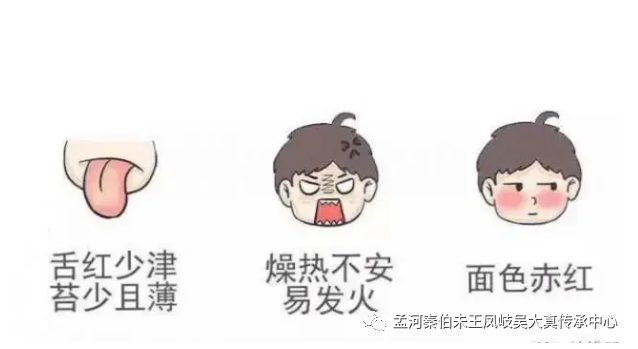
According to TCM theory, Yin deficiency refers to a series of diseases caused by insufficient Yin fluids (blood and body fluids) that fail to nourish the body and cannot generate Yang Qi. Yin deficiency with excessive Yang fire is a type of virtual fire, often resulting from insufficient essence and blood, severe damage to Yin fluids, and the combination of Yin deficiency and Yang excess, leading to the generation of internal heat and virtual fire. Generally, internal heat due to Yin deficiency is characterized by systemic signs of virtual heat, commonly including tidal fever, night sweats, flushed cheeks, irritability, insomnia, dry mouth and throat, dizziness, tinnitus, nocturnal emissions, short yellow urine, dry stools, or symptoms such as hemoptysis, epistaxis, or oral ulcers, with a red tongue and little fluid, and a thin, rapid pulse, all caused by the upward inflammation of virtual fire. The syndrome of Yin deficiency with excessive Yang fire can be more pronounced in different organs, primarily affecting the heart, lungs, liver, and kidneys, often presenting with dry throat and mouth, irritability, heat rising, or vivid dreams at night, palpitations, and short, red urine, which are signs of Heart Fire; or headaches, facial flushing, dry and painful eyes, bitter taste, dry stools, and wiry pulse, which are manifestations of Liver Fire; or dry cough with little phlegm, phlegm containing blood, indicating Lung Fire; or bone steaming tidal fever, flushed cheeks, accompanied by dizziness, lower back soreness, and fatigue, with nocturnal emissions in men, and in women, dreams of sexual intercourse, indicating Kidney Fire.
 2 Causes of Yin Deficiency with Excessive Yang Fire
2 Causes of Yin Deficiency with Excessive Yang Fire
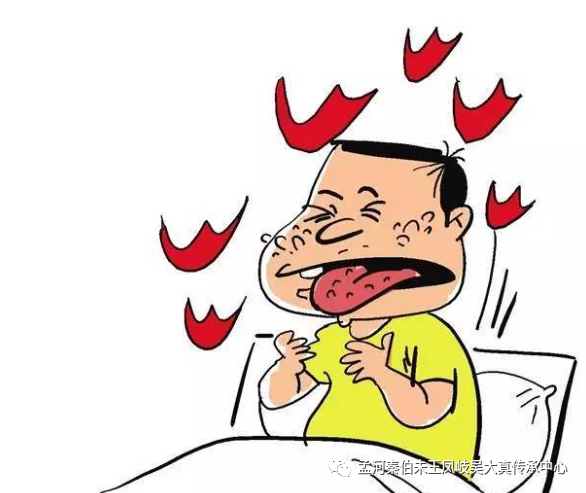
Yin not only nourishes and moistens the organs and tissues but also restrains Yang Qi to prevent its excessive outward expression. Yin is characterized by cold, tranquility, and descent, while Yang Qi corresponds to heat, movement, and ascension. If Yin is deficient and unable to restrain Yang Qi, the body will exhibit a state of excessive Yang Qi, known as “Yin deficiency with excessive Yang fire.” This condition can occur in the heart, liver, lungs, spleen, and kidneys, with liver and kidney Yin deficiency being more common. The main causes include overexertion, prolonged staying up late, aging, chronic illness, and excessive sexual activity, as well as hypertension and diabetes, which can also lead to excessive Yang fire. Overexertion leads to depletion of Qi and blood, preventing the liver and kidneys from receiving adequate nourishment, resulting in long-term Yin deficiency. Aging and chronic illness gradually deplete kidney essence and Qi and blood, leading to insufficient nourishment for the liver and kidneys, resulting in Yin deficiency. Excessive sexual activity causes kidney essence to be continuously transformed into reproductive essence, leading to kidney essence deficiency, which in turn causes liver deficiency. As stated in the Huangdi Neijing: “After the age of forty, Yin Qi is halved.” With aging, or after febrile diseases, or irregular sexual activity, true Yin is easily depleted.
 3 Treatment of Yin Deficiency with Excessive Yang Fire in TCM
3 Treatment of Yin Deficiency with Excessive Yang Fire in TCM
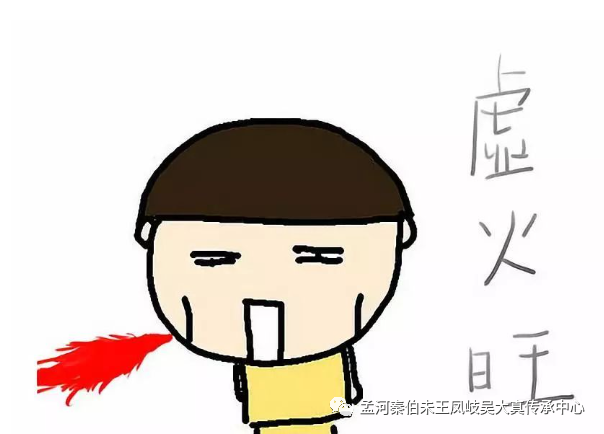
Yin deficiency with excessive Yang fire is a unique diagnostic pattern in TCM, indicating that various causes have led to the deficiency of Yin fluids in the patient’s body. TCM believes that Yin deficiency easily leads to internal heat, which can cause a series of symptoms associated with Yin deficiency and excessive Yang fire. Patients may exhibit symptoms of Yin deficiency, such as dry mouth and throat, dry skin, dry stools, and five hearts feeling hot, even experiencing tidal fever and night sweats, while also showing symptoms of internal heat, such as oral ulcers, sore throat, and other symptoms, which, combined with the manifestations of Yin deficiency, all belong to the syndrome of Yin deficiency with excessive Yang fire. Treatment primarily involves TCM herbal methods to nourish Yin and clear heat. The lungs, heart, stomach, and kidneys are particularly prone to Yin deficiency with excessive Yang fire, and different organs may present different manifestations, requiring differentiation and selection of different herbs for treatment.For Lung Yin deficiency with excessive Yang fire, the use of Bai He Gu Jin Wan (Lily Bulb and Rehmannia Pill) or Yang Yin Qing Fei Wan (Nourishing Yin and Clearing Lung Pill) is recommended; for Heart Yin deficiency with excessive Yang fire, Tian Wang Bu Xin Dan (Heavenly Emperor Heart-Supplementing Pill) can be chosen; for Liver and Kidney Yin deficiency with excessive Yang fire, Zhi Bai Di Huang Wan (Anemarrhena and Rehmannia Pill) or Hu Qian Wan (Tiger Hidden Pill) can be used; for Stomach Yin deficiency with excessive Yang fire, Yu Nu Jian (Jade Woman Decoction) is recommended for treatment.
 4 Daily Considerations for Yin Deficiency with Excessive Yang Fire
4 Daily Considerations for Yin Deficiency with Excessive Yang Fire
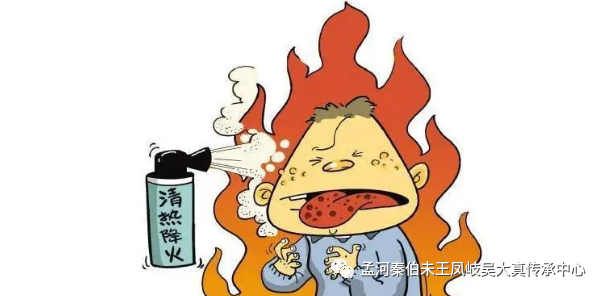
For those with Yin deficiency and excessive Yang fire, in addition to TCM herbal regulation, it is also essential to develop good lifestyle habits, adjust one’s mindset, daily routine, and diet.
1. Maintain a Light Diet: Meals should be regular and moderate. Individuals with Yin deficiency and excessive Yang fire should avoid spicy, stimulating, and greasy foods, such as chili, ginger, onions, and pepper, to prevent exacerbating symptoms. A light diet is recommended, with an emphasis on sweet, cool, moistening, and Yin-nourishing foods, such as tremella, lily bulb, lotus seeds, yam, black beans, soft-shelled turtle, white radish, winter melon, bitter melon, corn, snow pears, pomelo, and dragon fruit, which have Yin-nourishing and heat-clearing effects, helping to alleviate symptoms.
2. Develop Good Lifestyle Habits: Maintain emotional stability and a calm mind. Ensure adequate sleep, avoid staying up late, smoking, drinking alcohol, or engaging in intense exercise. Sexual activity should not be too frequent, and life should follow a certain routine, with appropriate physical exercise, avoiding prolonged periods of inactivity.
3. Avoid Weight Loss Drugs: Many people blindly resort to weight loss drugs to maintain their bodies. However, these drugs should not be taken in large quantities, as they can harm health and exacerbate the issue of Yin deficiency with excessive Yang fire.

